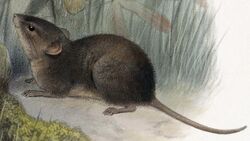Biology:Scotinomys
From HandWiki
Short description: Genus of rodents
| Scotinomys | |
|---|---|

| |
| Alston's brown mouse (S. teguina) | |
| Scientific classification | |
| Domain: | Eukaryota |
| Kingdom: | Animalia |
| Phylum: | Chordata |
| Class: | Mammalia |
| Order: | Rodentia |
| Family: | Cricetidae |
| Subfamily: | Neotominae |
| Tribe: | Baiomyini |
| Genus: | Scotinomys Thomas, 1913 |
| Type species | |
| Hesperomys teguina | |
| Species | |
|
Scotinomys teguina | |
Scotinomys is a genus of rodent, the singing mice, in the family Cricetidae.[1] Together with Baiomys, it forms the tribe Baiomyini. It contains the following species:
- Alston's brown mouse (Scotinomys teguina)
- Chiriqui brown mouse (Scotinomys xerampelinus)
They are found in mountainous areas in Central America, at altitudes of 1000 m to at least 3500 m.[2] As their common name indicates, they are notable for their acoustic communication. They are insectivorous. The two species show substantial divergence in behaviour and reproduction,[3] with S. xerampelinus generally dominant over S. teguina where the species occur together.[4]
References
- ↑ Musser, G.G.; Carleton, M.D. (2005). "Genus Scotinomys". in Wilson, D.E.; Reeder, D.M. Mammal Species of the World: A Taxonomic and Geographic Reference (3rd ed.). Johns Hopkins University Press. pp. 1085–1086. ISBN 978-0-8018-8221-0. OCLC 62265494. http://www.departments.bucknell.edu/biology/resources/msw3/browse.asp?id=13000518.
- ↑ Hooper, E. T. (1972). A synopsis of the rodent genus Scotinomys. Occasional Papers of the Museum of Zoology, University of Michigan, 665, 1-13.[1]
- ↑ Hooper, E. T., & Carleton, M. D. (1976). Reproduction, growth and development in two contiguously allopatric rodent species, genus Scotinomys. Miscellaneous Publications of the Museum of Zoology, University of Michigan, 151, 1-52. [2]
- ↑ Pasch, B.; Bolker, B. M.; Phelps, S. M. (2013-09-09). "Interspecific Dominance Via Vocal Interactions Mediates Altitudinal Zonation in Neotropical Singing Mice". The American Naturalist 182 (5): E161–E173. doi:10.1086/673263. PMID 24107377. https://repositories.lib.utexas.edu/bitstream/2152/31196/1/InterspecificDominance.pdf.
Wikidata ☰ Q431119 entry
 |

